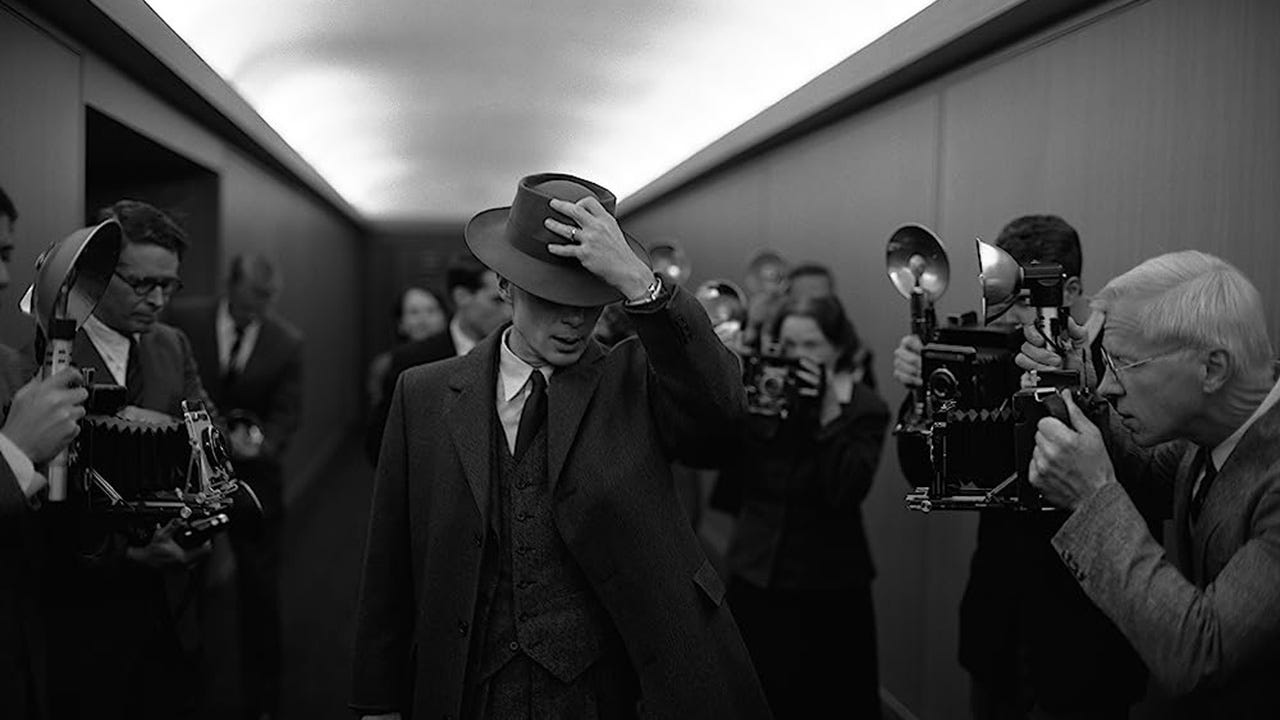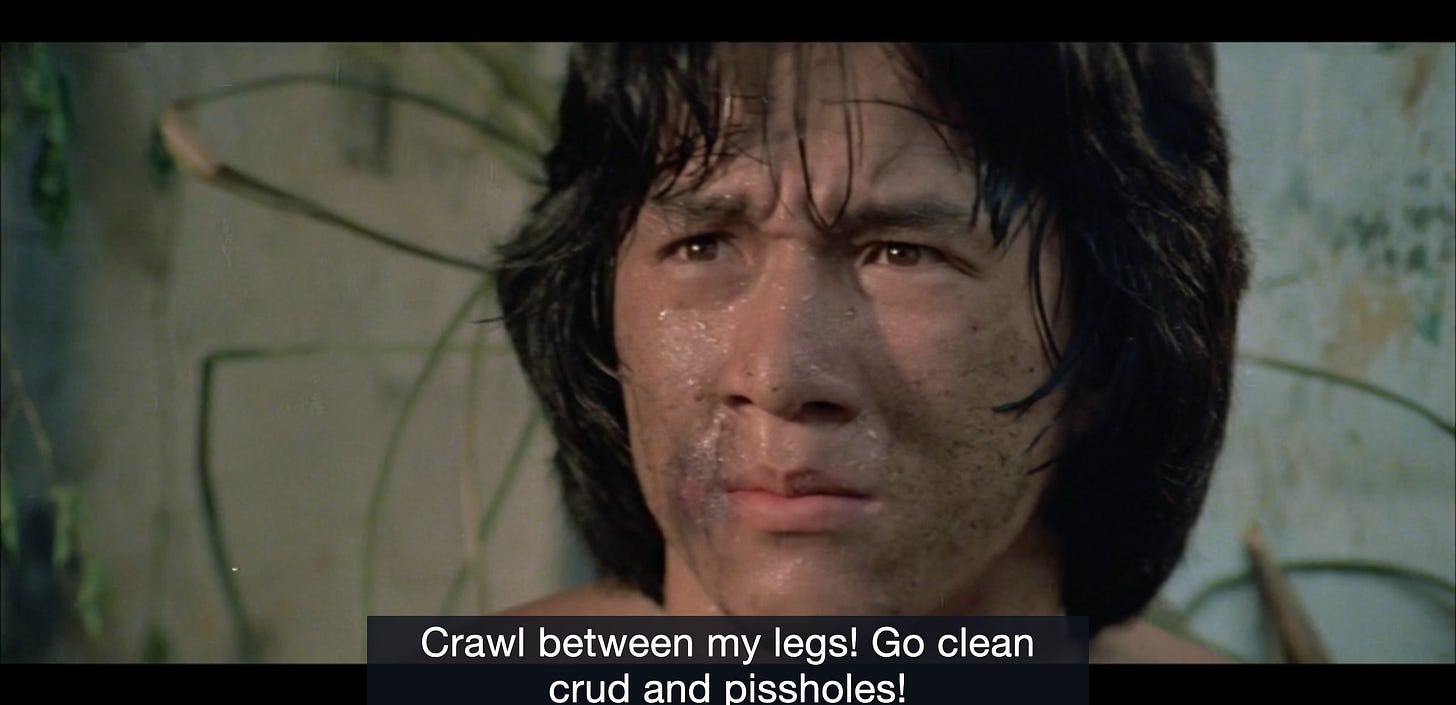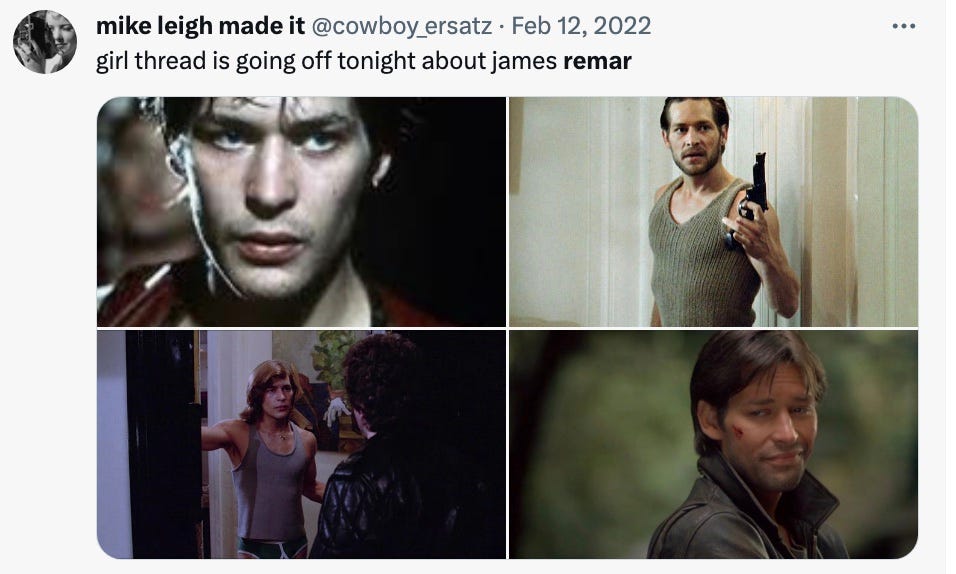Favorite First Watches of July
Five Films new to me this past month, including a few unseen classics
Making Mr. Right (1987) Dir. Susan Seidelman
Susan Seidelman is — in my opinion — one of the most undervalued and underrated auteurs of the late 20th century. The visionary behind cult comedy masterpieces like Desperately Seeking Susan (1985), Cookie (1989), and She-Devil (1998), Seidelman’s slyly feminist films unabashedly embrace a hyper femme aesthetic, luxuriating in pinks, candy apple red, and downtown fashionista chic, with particular attention to production and costume design. She is a full visual director: everything, from the sets to the costumes to the filming locations work seamlessly in tandem with one another to create a definite aesthetic vision (she abandons her beloved New York City for this one, set in Miami). The best Miami-based films engage with the city on an aesthetic level, mimicking the pastel colors, Art Deco style, and visual outrageousness that the city is known for); so in that sense, Seidelman is a perfect fit for this film — her follow-up to Desperately Seeking Susan (1985) — about a stylish PR agent (former It Girl Ann Magnuson, fantastic here) tasked with humanizing a sentient android designed to eventually explore deep space (played by a dishy John Malkovich, who also doubles as the robot’s asocial creator). Things get complicated when the PR agent falls for the android, captured in an oddly touching romance that concludes on a particularly poignant note. Like most of Seidelman’s films, the result drew mixed reviews from critics at the time of release, who didn’t quite seem to get what she was trying to do with her black comedies: this film feels incredibly ahead of its time, both in its modern treatment of its female protagonist and the straight-faced goofiness it whole-heartedly embraces (very proto-Wes Anderson). It’s currently playing as part of the Criterion Channel’s showcase of Seidelman’s work, though it lacks the star power of her other films, which tend to garner more attention. This was a blindspot for me! Making Mr. Right (1987) is currently streaming on the Criterion Channel, as well as Tubi.
Drunken Master / 醉拳 (1978) Dir. Yuen Woo-ping
The film that made a young Jackie Chan a box office superstar throughout Asia, this kung-fu classic is an appealing early look at the cultivation of Jackie’s onscreen persona as a particularly deadly clown. Directed by legendary Hong Kong fight coordinator and filmmaker Yuen Woo-ping (best known to Western audiences for his work choreographing The Matrix and Crouching Tiger Hidden Dragon), the film’s fight sequences — a unique take on the Zui Quan (or "drunken fist") fighting style — are beautifully fluid and tightly controlled, just like watching a hypnotizing dance. The film tells the story of a young martial arts student (Jackie), who —after pissing off a local fighter who insults his master father’s martial arts teachings— is sent to the titular drunken master (Yuen Siu-Tin) for training. At first skeptical of the drunken man’s training — which takes particular care to strengthen Jackie’s wrists — the young fighter soon works to master the fictional "Eight Drunken Immortals," named after eight xian (or everlasting spirits) from Chinese folk culture, a technique that improves when he is intoxicated (the point of “drunken boxing” style is to disarm your opponent by making them believe you are out of control due to inebriation). Jackie, obviously, nails the onscreen fighting, but it’s the fluid way he moves through every frame that I found most fascinating. He is as likely to trip and fall as he is to break out a fight move; always in motion, his compact body disciplined into a rigorous machine (and on display like I’ve never seen before, a frankly fascinating glimpse behind the curtain, like seeing Gene Kelly’s bare thighs in The Pirate). Jackie was trained as an acrobat from his early days at a keban opera school — where he also mastered martial arts — and he glides, contorts, and bumbles his way through this film as befitting his expertise. His “drunken” fighting reminded me of Fred Astaire’s “drunken dancing,” a pantomime requiring incredible control to evoke the feeling of uninhibited motion; beautiful and funny in equal turns. His natural charisma and knack for physical comedy transcends language: I watched a particularly horrendous English dub on Tubi, and even lines like “Go clean crud and pissholes!” couldn’t take away from the magnetism and grace of Jackie’s performance, as well as the universality of his comedy.
His drunken antics also reminded me of Chaplin’s night out in City Lights, where the viewer derives pleasure from watching a perfectionist mime being completely out of control. Chaplin, like Jackie, transcended language barriers: comedy is a shared language, crossing time and space through the universal power of laughter. In this film, Jackie isn’t a god: he’s a bored and bumbling fool, who happens to transfer his manic energy into deadly terror. That’s why he’s our champion. Drunken Master (1978) is currently streaming for free (with ads) on Tubi, Youtube, and Amazon Prime.
Oppenheimer (2023) Dir. Christopher Nolan

“sloppy toppy from oppy” was an unhelpful intrusive thought throughout the duration of this film 180 minute film. Photo from UNIVERSAL PICTURES I’d describe my relationship with director Christopher Nolan as a love-hate situation: I’m well aware of his weaknesses (how he writes female characters, his aversion to sex, his proclivity for bombastic scoring, his love of a heavy-handed metaphor and even greater love of lampshading that metaphor for the viewer, etc…), but I am, at heart, a basic film bro, and when he succeeds, it’s a thrilling thing to behold. The king of summer box office, I’ve seen at least two of his films on my birthday (Inception and The Dark Knight) yet regard his filmography as a bit of a draw. If you had told me pre-Barbenheimer that his dramatization of the life of J. Robert Oppenheimer (or “Oppy,” as he’s frequently called in the film), father of the atomic bomb, would wind up being Nolan’s best film, I would have never believed you. Maybe the removal of fantastical elements helped ground the film, but the result is tighter and stronger than anything we’ve seen from the filmmaker. Could this tale of misguided genius and dangerous ego actually be his chef d’oeuvre? After all, his kids do call him “Woodcock” because he’s such a dick and a control freak. We watched this in 70mm IMAX late on a Sunday evening at Lincoln Center, and I cannot overstate the impact of seeing Cillian Murphy’s weathered middle-aged mug in invasive close-up, his tortured visage stretching up the height of a skyscraper. It’s impossible to watch the film and not wonder the success Nolan could have found in casting his beautiful pseudo-muse as more than supporting parts in his previous films: Murphy is one of our finest (and most underrated) actors, but he’s never been given a role quite like this one, where he’s so prominently featured at the expense of all other characters. He haunts practically every frame, like a man living out his Christmas Carol visitations in fragmented and muddled bursts; never at ease, never confident enough in his own mind to hold definite political convictions, even as he is thrust into the world of global politics due to his research. The nightmare Nolan conjures is genuinely existentially thought-provoking (I can’t believe I’m saying that!), as it imagines a fate worth than death: a guilt so complex that it invades every silence and every pause, as he grapples with the fact that he has placed the world on a timeline that inevitably ends with the complete destruction of all of mankind. Nolan’s film certainly does not absolve Oppy of his scientific crimes; if anything, it condemns him as the worst kind of person…one who believes in nothing. Through a combination of tight editing, dynamic sound design (what was that noise? what am I hearing? is this real? is this inside Oppy’s head?), and a sprawling cast of some of our greatest living character actors (shout out James Remar, who actually improvised the film’s most memorable line), Nolan has made one of the best historical thrillers in recent memory. I’m so serious! Maybe it takes a populist filmmaker like Nolan to achieve this kind of (secretly weird) character study masquerading as a mainstream biopic. Oppenheimer (2023) is currently in theaters.
The Red Queen Kills Seven Times / La dama rossa uccide sette volte (1972) Dir. Emilio Miraglia

Barbara Bouchet doesn’t let her full-time fashion photography job get in the way of some light sororicide For the longest time, I skipped over this underrated bit of giallo, as I had never heard of director Emilio Miraglia and tend to take an auteurist approach to the genre (skewing to the works of Sergio Martino, Dario Argento, Lucio Fulci, and Umberto Lenzi). Miraglia didn’t make many films (he is best known for directing this and the 1971 film The Night Evelyn Came Out of the Grave), and this film was actually his final picture, but this stylish thriller is among best of the Italian horror microgenre, thanks to its beautiful composition, stylish wardrobe, and chic Euro location shooting. The film stars a cast of relentless beautifully women, but none as stunning as lead Barbara Bouchet, a fashion photographer with a groovy blonde ‘do and kicky early 70s wardrobe, who is trying to navigate her dead grandfather’s will, which bequeaths her his castle estate to be shared with her sister, who she maybe definitely accidentally killed and also who maybe definitely was haunted by the “red queen,” a character from a folk story about a vengeful woman who kills seven times every hundred years. Things become even more complicated when a woman dressed as the “red queen” begins murdering people. Like other entries into the genre, this one is stacked with both characters and plot, but is so simple and satisfying in its pleasures. Voiced in Italian and shot predominantly in Würzburg and Weikersheim in Germany, the film is a compelling mash-up of disparate elements, making it the best kind of international goulash. The Red Queen Kills Seven Times (1972) is currently streaming on Tubi.
Twister (1996) Dir. Jan de Bont
My childhood best friend got married this weekend at her parents’ home in Colorado. Sitting out on the porch overlooking a gorgeous mountain cluster, there was just one topic that was on everyone’s lips as she underwent her makeover into a proper blushing bride: the 1996 disaster film Twister. This inspired me to close out the month of July by watching one of my biggest blind spots: Twister, Jan de Bont’s film about a couple of tornado chasers (Bill Paxton and Helen Hunt), who rekindle their fractured romance while carrying out a research mission. Deliciously grounded (their overarching goal is just to study the inside of a tornado to create a faster warning system) and appealingly straight-faced, the film is a great example of the sort of big budget mainstream action filmmaking that has completely disappeared in the face of a regular glut of disaster movies with diminishing returns (I’ve watched Geostorm, so I’m kind of an authority on these matters). Dialogue may be arch (“Bill [Paxton] is the most outta control son of a bitch in the game!”), but at least it’s never condescending or self-referential. You showed up to watch a team of people — including a sinister nightcrawler (played with villainous perfection by Cary Elwes) — chase a tornado through open space like it’s a celebrity. And that’s what you get! Auteur Filmmaker Jan de Bont (of Speed and Speed 2: Cruise Control fame) is a bit of a running joke online, thanks to his eclectic career as an action cinematographer/director and this Bill Hader Bit from Popstar, but it’s hard not to feel a bit awed at the action set pieces here, including a stunning car crash through an upended house. Most importantly, like Oppenheimer, this film is just chock full of guys: Paxton aside (“I'm not back!” he keeps insisting throughout the film, my favorite thing A Guy Can Do), there are appearances by Philip Seymour Hoffman, Ferris Bueller’s Day Off / Succession secret weapon Alan Ruck, Tár director Todd Field, Jeremy Davies, Zach Grenier, and icon Lois Smith as Helen Hunt’s aunt. Go chase that tornado, she encourages her niece, after almost getting pancaked in her own home. Some men want to watch the world burn, some women just want to get some sensors all up in a twister to avenge their dead daddy, murdered by an F5 tornado. Twister (1996) is currently streaming on [HBO] Max.








